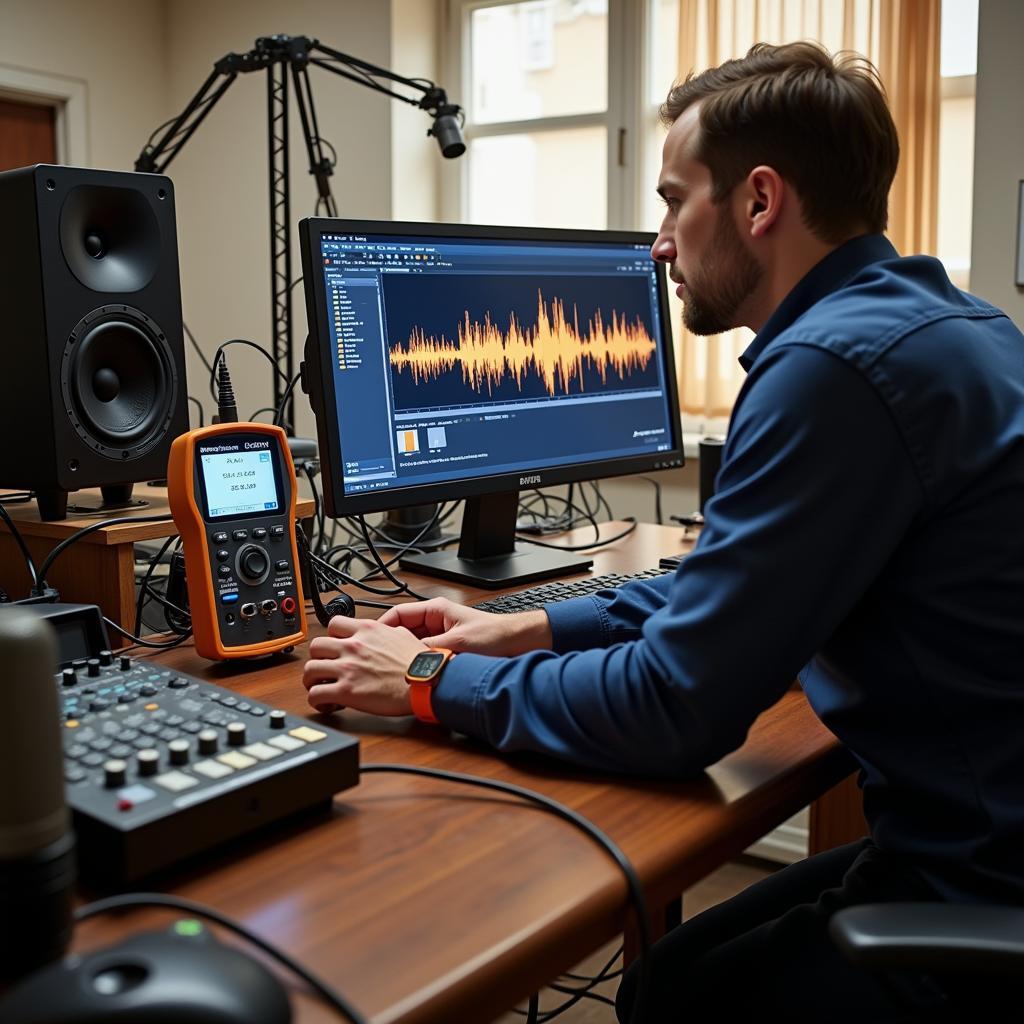Acoustic research delves into the fascinating world of sound, exploring its properties, behavior, and impact on our environment. From the whispers of nature to the complexities of human communication, acoustic research seeks to understand the fundamental principles that govern this ubiquitous phenomenon. This exploration encompasses a vast spectrum, spanning from the intricacies of sound production and propagation to the development of cutting-edge technologies for noise control, architectural acoustics, and audio engineering.
Exploring the Depths of Acoustic Research: Methods and Applications
Acoustic research employs a diverse range of methodologies, each tailored to specific research objectives. These methods include sophisticated measurements of sound pressure, intensity, and frequency, often using specialized equipment like microphones, sound level meters, and spectrum analyzers. Furthermore, computational modeling plays a crucial role, allowing researchers to simulate sound propagation in various environments and predict the effects of different acoustic treatments. These models are invaluable for designing concert halls, optimizing noise barriers, and developing advanced audio systems.
Acoustic research extends its reach into numerous practical applications, impacting fields as diverse as medicine, architecture, and environmental science. In medicine, acoustic research underpins the development of ultrasound imaging techniques, enabling non-invasive diagnosis and treatment of various medical conditions. In architecture, it guides the design of spaces that optimize sound quality and minimize noise pollution, creating environments conducive to learning, performance, and well-being. Environmental acoustic research focuses on understanding and mitigating the impact of noise pollution on human health and wildlife, contributing to the development of sustainable urban environments.
 Acoustic Research Equipment in a Laboratory
Acoustic Research Equipment in a Laboratory
Acoustic Research and the Paranormal: Investigating Unexplained Sounds
The realm of Paranormal Research often intersects with acoustic research, particularly when investigating unexplained sounds and phenomena. Reports of ghostly whispers, mysterious knocks, and unexplained electronic voice phenomena (EVP) frequently prompt investigations utilizing acoustic analysis techniques. Researchers meticulously analyze recordings of these anomalous sounds, seeking to identify their source and nature. While many such sounds can be attributed to natural or man-made causes, some remain enigmatic, defying conventional explanations and fueling further investigation. This area of acoustic research demands a rigorous scientific approach, carefully considering all possible explanations before attributing a sound to paranormal origins.
Acoustic research provides valuable tools for analyzing EVP recordings, allowing researchers to filter out background noise, enhance subtle sounds, and analyze the frequency spectrum for anomalies. By comparing these recordings to known sound sources, researchers can often determine whether a sound is consistent with natural phenomena or warrants further investigation. However, interpreting these findings requires caution and a deep understanding of acoustic principles, acknowledging the potential for misinterpretations and the importance of maintaining a skeptical yet open mind.
The Future of Acoustic Research: Emerging Trends and Innovations
The field of acoustic research continues to evolve, driven by technological advancements and growing interdisciplinary collaborations. Emerging trends include the development of advanced acoustic metamaterials, which can manipulate sound waves in unprecedented ways, paving the way for innovative noise control solutions and enhanced audio technologies. The integration of artificial intelligence and machine learning is also transforming acoustic research, enabling the development of sophisticated algorithms for sound recognition, source localization, and automated analysis of complex acoustic data.
Furthermore, acoustic research is playing an increasingly important role in addressing pressing environmental challenges. The study of soundscapes, the combined acoustic environment of an area, is providing valuable insights into the impact of human activity on natural ecosystems. This research contributes to the development of strategies for noise mitigation and conservation of biodiversity, ensuring a harmonious coexistence between human development and the natural world.
 Advanced Acoustic Technology in a Research Lab
Advanced Acoustic Technology in a Research Lab
Conclusion
Acoustic research is a dynamic and multifaceted field that continues to uncover the intricate workings of sound. From its fundamental principles to its diverse applications, acoustic research provides valuable insights into our world and the universe beyond. As technology advances and our understanding deepens, acoustic research promises to unlock even greater mysteries and pave the way for innovative solutions to some of the most pressing challenges facing our world. Acoustic research remains a vital tool for exploring both the tangible and intangible aspects of our acoustic environment, offering a unique lens through which to view the world around us.
FAQs
- What is the primary focus of acoustic research? (Answer: The study of sound, its properties, behavior, and impact.)
- How is acoustic research used in medicine? (Answer: It underpins ultrasound imaging and other diagnostic techniques.)
- What role does acoustic research play in paranormal investigations? (Answer: It helps analyze unexplained sounds and phenomena like EVP.)
- What are some emerging trends in acoustic research? (Answer: Acoustic metamaterials, AI integration, and soundscape studies.)
- Why is acoustic research important for environmental conservation? (Answer: It helps understand and mitigate the impact of noise pollution on ecosystems.)
- How can I learn more about acoustic research? (Answer: Explore academic journals, online resources, and university programs.)
- What careers are available in acoustic research? (Answer: Acoustic engineer, audiologist, researcher, and consultant.)
Contact Us
For any inquiries or assistance, please contact us:
Phone Number: 0904826292
Email: research@gmail.com
Address: No. 31, Alley 142/7, P. Phú Viên, Bồ Đề, Long Biên, Hà Nội, Việt Nam
We have a 24/7 customer service team available to assist you.